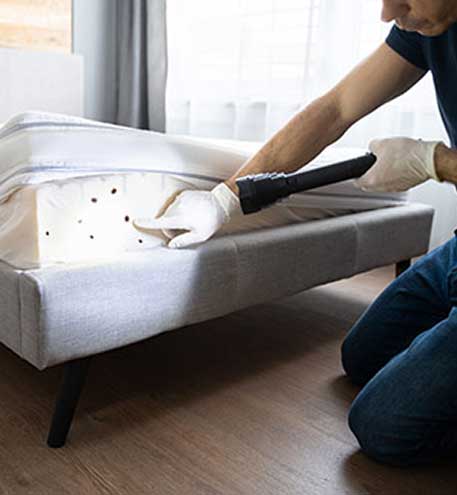Efficient Kings Pest Control Cincinnati Ohio: Reputable Solutions
Efficient Kings Pest Control Cincinnati Ohio: Reputable Solutions
Blog Article
Types of Insect Control: Which Technique Is Right for Your Problem?
When confronted with an insect invasion, the choice of an ideal method for bug control is crucial in successfully handling the circumstance. From chemical therapies to biological solutions, there exists a series of techniques that can be employed to resolve various sorts of pests. Each method comes with its very own collection of considerations and benefits, making the decision-making procedure a nuanced one. Comprehending the subtleties of each technique and reviewing their compatibility with the details parasite invasion at hand is important for accomplishing long-lasting success in parasite monitoring. By checking out the different kinds of insect control methods available, people can make informed decisions customized to their one-of-a-kind scenarios, making sure a much more lasting and reliable end result in bug removal.
Chemical Insect Control
Chemical parasite control includes making use of synthetic or naturally acquired chemicals to manage and get rid of pest populations successfully. This method is commonly used in agriculture, forestry, and property setups to fight a variety of pests, consisting of rodents, pests, and weeds. The use of chemical pesticides can give quick and targeted services to pest problems, making it a popular choice for numerous people and companies.
Among the crucial advantages of chemical insect control is its capacity to promptly eliminate insects, minimizing the threat of damage to crops, building, and human health. By utilizing certain chemicals that target specific parasites, this approach can effectively control infestations while reducing damage to helpful microorganisms and the setting when used appropriately.
Nonetheless, the usage of chemical parasite control additionally elevates problems concerning possible damaging results on non-target varieties, water resources, and human health and wellness. It is vital to adhere to safety and security standards, apply chemicals responsibly, and consider alternative pest control methods to reduce these dangers and guarantee sustainable pest administration methods.
Biological Parasite Control
Biological pest control, likewise understood as biocontrol, utilizes living microorganisms to minimize and handle insect populations normally. This approach uses the power of nature to manage insects without the need for artificial chemicals. Biocontrol can include the introduction of natural opponents of the parasite species, such as pathogens, predators, or bloodsuckers, to suppress bug populations. By making use of the parasite's natural predators or virus, biological pest control uses a eco-friendly and sustainable service to pest management.

Mechanical Insect Control
Using hands-on and physical techniques to take care of insect populations, mechanical parasite control provides a different strategy that does not rely on using living organisms or synthetic chemicals. This approach includes using barriers, traps, or other devices to literally prevent or eliminate pests. By blocking pest entrance factors or establishing up traps to capture them, mechanical pest control can successfully reduce infestations without presenting chemicals into the setting.
One common example of mechanical insect control is making use of mesh screens try this site on doors and home windows to avoid insects from entering buildings. This easy yet effective method serves as a physical barrier, maintaining insects out while permitting for appropriate ventilation. In addition, devices like mousetraps, fly swatters, and ultrasonic repellents fall under the mechanical insect control category.
While mechanical parasite control approaches can be labor-intensive and need normal tracking and upkeep, they provide a sustainable and ecologically pleasant service for taking care of insect problems. By combining various mechanical techniques, homeowner can create a detailed parasite control technique that decreases reliance on chemical pesticides.
Physical Insect Control

Some usual physical bug control techniques include making use of obstacles such as webs or displays to avoid insect entry, catches to catch and remove parasites, and hand-picking to literally remove pests from plants or frameworks. Furthermore, techniques like warmth treatments can be used to regulate insects like bed bugs by elevating the temperature to levels that are dangerous to the insects.
Physical parasite control is especially helpful in incorporated insect management (IPM) methods, where multiple parasite control techniques are incorporated for efficient pest administration while reducing using chemicals. By using physical pest control methods, individuals can efficiently attend to pest invasions with minimal environmental effect.
Integrated Pest Administration
When implementing physical bug control methods as part of parasite management approaches, Integrated Insect Monitoring (IPM) emerges as a detailed strategy that leverages different strategies to effectively manage pest populaces. IPM focuses on long-term avoidance of parasites through a combination of organic, social, physical, and chemical tools tailored to certain parasite issues. By integrating several control techniques, IPM aims to lessen the threats related to insects while likewise lowering dependence on chemical solutions.
One key element of IPM is the focus on surveillance and analyzing pest populaces to determine the most suitable control techniques. This positive technique enables very early treatment and targeted approaches, leading to more efficient insect management. Furthermore, IPM advertises ecologically pleasant methods by prioritizing non-chemical control techniques and only utilizing chemicals as a last option.
Verdict

By making use of the parasite's all-natural predators or pathogens, biological insect control provides a sustainable and ecologically friendly option to pest management. - Kings pest control Cincinnati Ohio
Using physical and hand-operated approaches to take care of parasite populaces, mechanical parasite control supplies a different strategy that does not count on the usage of living microorganisms or synthetic chemicals.An efficient method to handling insect populations without relying on chemical or organic approaches entails the usage of physical insect control strategies.When implementing physical pest control approaches as part of pest monitoring approaches, Integrated Insect Management (IPM) arises as an extensive strategy that leverages different methods to efficiently control pest populaces. Chemical bug control includes the use of pesticides, organic bug control uses natural killers, mechanical bug control involves physical barriers, physical bug control includes trapping or getting rid of parasites, and incorporated parasite management integrates numerous techniques for a holistic strategy to pest control.
Report this page